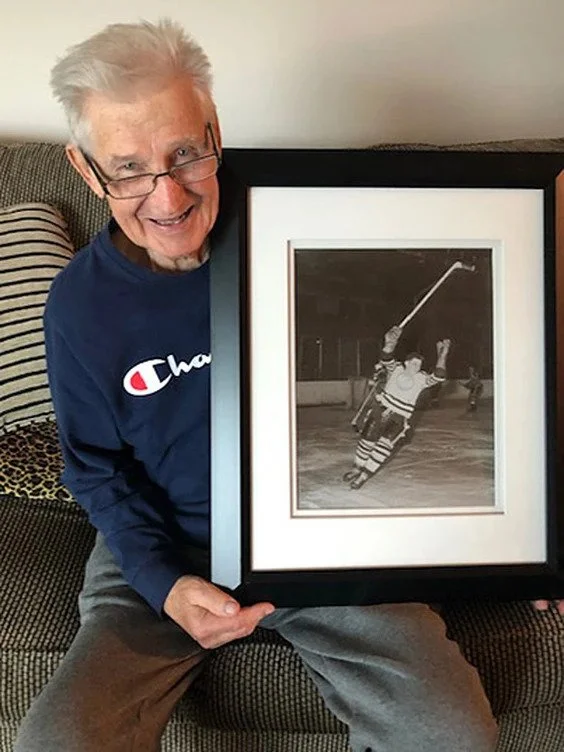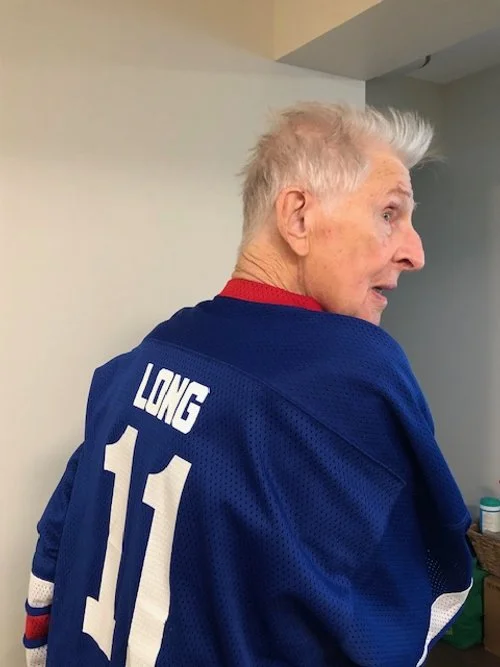Kennedy: Ultimate survivor Eddie Long an unsung Kingston sports hero
Kingston Ponies batboy Eddie Long sits alone in the bottom row for a 1950 team photo. Photo supplied
October 16, 2023
By Patrick Kennedy
Canadian Baseball Network
Eddie Long’s story is one that’s equal parts joy and jarring sadness, despair and dogged determination, hardship and happiness. And that’s just his childhood.
“Hey, I’m still here,” cackled the 80-year-old, laughing at having bucked the odds against him ever reaching octogenarian status.
Eddie Long’s name doesn’t leap to mind when the topic of great Kingston athletes is broached. Yet maybe it should. Not for sheer athletic ability — which he had — but for what he overcame as a wee lad. We’re talking about obstacles such as a restricting birth defect and the wrenching heartbreak of being an orphan. Factor in those grim truths, and it says here that Eddie’s among Kingston’s all-time best.
In his youth, during the latter half of the 1950s and early ‘60s, Eddie Long was a dandy southpaw pitcher and slick-fielding first baseman on several local all-star ball clubs, including a crackerjack junior club coached by Bob Elliott Sr. that more than held its own in a blue-chip Kingston men’s house league.
Yet it was in hockey where Eddie blossomed. He did so first on the blue line in the old Rotary Kiwanis loop, then with a formidable Junior B Frontenacs club, and later as both a rearguard and a defence-minded “200-foot” forward with the Kingston Aces of the Ontario Hockey Association Senior A league.
Eddie Long, 80, holding a photo of his younger self, as a Kingston Jr. B Frontenacs forward, after his goal sealed a 5-3 victory over the Napanee Red Wings in 1963. Photo supplied.
Long knew one speed on skates — full throttle. “Fast Eddie” could render the Energizer Bunny breathless. Despite that, prior to his sporting exploits, he had a childhood that was anything but typical or idyllic. Young Eddie had to clear some high hurdles.
He never knew his father, and when Eddie was still a wee gaffer, his mother abandoned him with the Children’s Aid Society (CAS).
“My mom visited a few times, we’d talk while she sat in the back seat of a taxi driven by her boyfriend,” he recalls candidly during an interview in the apartment he now shares with longtime partner Jan Patterson. “After two or three visits, I never saw my mom again.”
The CAS placed young Eddie with the Walker family of 24 Stephen St., a short pop fly from the new Megaffin Stadium that was built in 1946 for Kingston’s professional baseball team, the Ponies. His placement with the Walkers and the house’s proximity to the ball yard were Eddie’s first real breaks in life.
“It wasn’t always easy being in that house,” Long remembers. “The Walkers had nothing, really, but Mrs. Walker was a kind, caring person whose husband was a crippled-up old stone mason with bundled feet. I don’t know how many nights I soaked his feet in Epsom salts.”
Long himself knew the frustration of coping with a disability. He’d been born with a crooked neck that left his head tilted to one side and one shoulder sloped noticeably lower than the other. That caused him to walk with a somewhat laboured gait.
Around the age of five, Long started going to Megaffin Stadium with a neighbour who cleaned the grandstands after Ponies games. Soon young Eddie was working a broom and doing odd jobs at the ballpark. That led the Ponies players to befriend the industrious little lad who seemed to look at the world sideways. They bought him a little Ponies uniform. One player in particular, a kindhearted American named Bill Meara, intervened on young Eddie’s behalf with CAS to push for corrective surgery that would allow the lad to run and play like a normal kid.
“I was in a cast from my head to my waist for about three-quarters of a year, with only my ears and face uncovered,” Eddie recalls, pointing to where stabilizing rods held his head in place. “What made it even worse was that I had chicken pox and the measles while I was in the darn cast.”
The life-altering surgery was successful. Finally able to walk and run normally, Eddie started playing sports. But he still had a big problem: The Walker household was not flush with money for such extracurriculars. Eddie needed another break, which he soon received from local sportsman Wally Elmer, a Kingston sports Hall-of-Famer.
“Mr. Elmer approached me one day at the stadium and asked where I lived and if I wanted to come to his dry-cleaning store on Saturday to earn a little change,” Eddie recalls. “Of course, I said yes. It was money, and I didn’t have any.”
Businessman Elmer, an ardent supporter of local sport, told Mrs. Walker about the job offer, and thereafter Eddie spent most Saturdays working at Elmer’s Patton’s Cleaners, where he was joined by such aspiring young athletes as Donnie Bellringer and others.
“It was Mr. Elmer who got me into hockey,” Eddie says of the former pro player who won a Stanley Cup with the 1925 Victoria Cougars. “He bought me a new pair of skates and gave me Donnie Bellringer’s old equipment, which was much too big, not that I cared.”
He laughs uproariously, slapping together two powerful hands that wouldn’t look out of place on an ironworker.
Long developed quickly as a hockey player. He played in the old Rotary Kiwanis loop and toiled three seasons with the Kingston Jr. B Frontenacs, including the 1961-62 campaign when the club reached the provincial final. His coach was Maj. Danny McLeod, the man who later guided the Kingston Aces.
The Aces. The mere mention of the name twists Eddie’s weathered mug into another wide grin. He played eight seasons for Kingston’s top shinny squad, second most in team history behind Bob Collins (nine). Long, who earned his daily bread as an electrician, played 225 career games and tallied 174 points, including 57 goals, heady totals for a player who primarily played defence during his first half-dozen campaigns.
“Eddie was a great teammate and he’s been an even better friend,” lauds Aces nimble netminder Tom Mercer, 79. Each man was the best man at the other’s wedding. “He’s a happy, good-natured guy, which is unusual for someone who hasn’t been given a lot in life to be happy about.”
Jim Sprott, the Aces’ angular sniper, says Eddie was a special teammate.
“Has there ever been a better team player than Ed Long? I don’t think so,” the 79-year-old Sprott says. “In my books, he’s one of Kingston’s most unsung heroes. He never got the credit he deserved, and when he did get some praise, he deflected it on his teammates.
“How he’s endured after what he’s been through the last several years … he’s the ultimate survivor.”
Sprott alludes to the cancer that a few years ago flattened Long and left him facing a 10 count. Thanks to an unwavering will and chemotherapy, Eddie got up off the canvas to continue the fight.
Even today, with the cancer in remission, he still undergoes dialysis thrice weekly.
Unsung Kingston hockey hero Eddie Long recently won a hard-fought battle against cancer. Photo supplied.
His most memorable time with the Aces was the team’s stirring 1967 playoff run that resulted in a league title. Eddie, Sprott and seasoned ex-pro Tom Carty were tossed together as a checking line, often pitted against the opposition’s top unit. During the post-season run, the trio flipped the script and instead filled the opponent’s net. The line combined for 42 points in 16 games. In a semifinal contest against the Toronto Grads, Long scored four goals, still a treasured memory more than 60 years later.
“We were a checking line, so come hell or high water you didn’t try to score,” he says. “But we did anyway.”
Eddie’s eyes twinkle merrily. “Tommy and Jimmy were the playmakers, I was just a grunt who was in the right place at the right time.”
There he goes again, deflecting praise.
Sometimes good things do happen to good guys.



